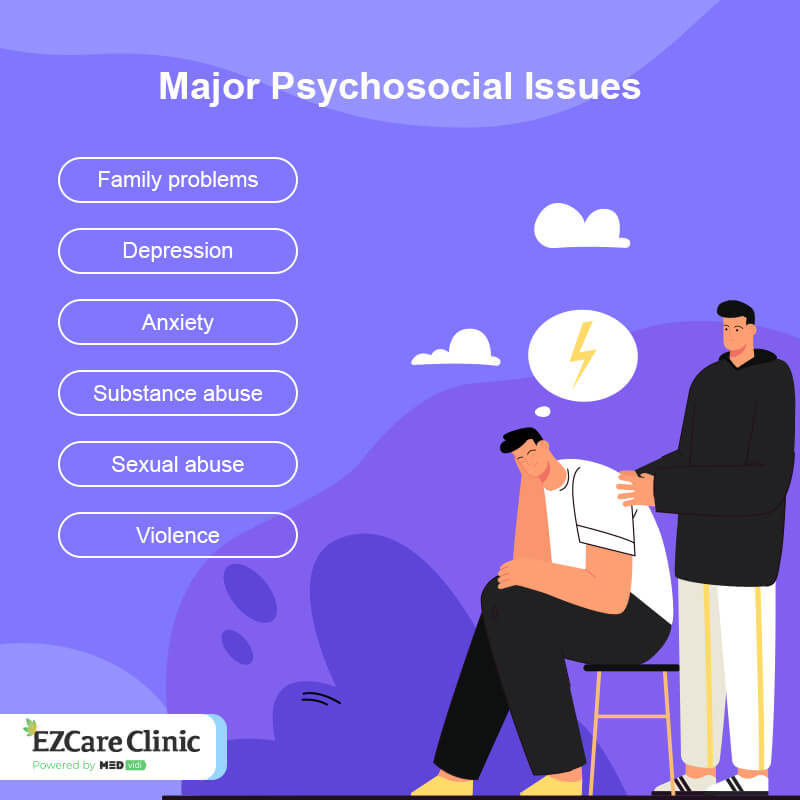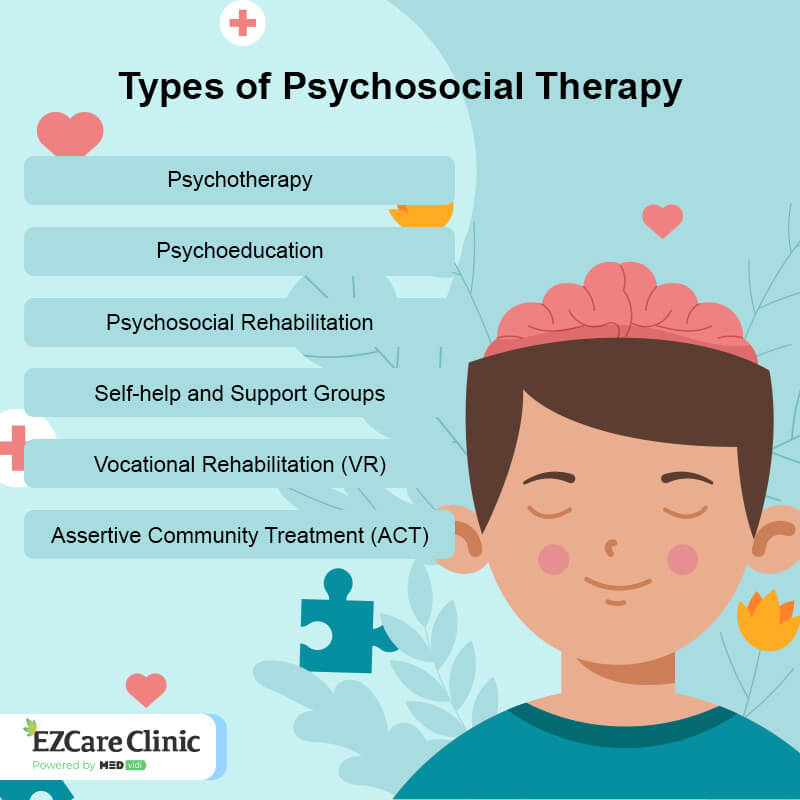Many people have difficulty being in public places or interacting socially. Some may develop anxiety or panic disorders. Others may be dealing with a mental illness like schizophrenia or a condition that falls somewhere along the autism spectrum.
Either of these disorders can result in behaviors that lead to isolation and feelings of anxiety or depression.
Psychosocial therapy is used to help people battling mental health issues become more familiar with social behaviors and give them the freedom to interact with others at a level that is within their comfort zone.
Get professional help regarding behavioral or emotional disturbances– Click below.
What Is Psychosocial Therapy?
Psychosocial therapy uses treatment options that allow a patient to gain the social skills they need to be able to overcome any behavioral or emotional disturbances they may experience due to their disorder.
Therapy encourages social interaction and gives the patient the confidence they need to seek contact with others in a variety of forms.
Common psychosocial treatment options include:
- Cognitive-behavioral therapy
- Family-focused therapy
- Exposure therapy
- Interpersonal therapy
- Dual diagnosis integrated therapy
- Assertive community treatment (ACT)
- Dialectical behavior therapy (DBT)
These treatment options offer several tools that patients can use when they are trying to get accustomed to being more socially active.
Are There Different Types of Psychosocial Therapy?
The most common forms of psychosocial therapy include:
- Psychotherapy
- Psychoeducation
- Psychosocial rehabilitation
Each type offers specific skills and benefits a patient can use to improve their social skills.

1. Psychotherapy
Psychotherapy involves sitting down with the patient and their family, friends, or others and talking about what is affecting them.
They will learn about their:
- Moods
- Feelings
- Other aspects of their mental health
2. Psychoeducation
Psychoeducation teaches the patient and their families about the diagnosis they have received and what their treatment options may include. They are instructed on self-care and what they can do to help themselves as they move forward.
3. Psychosocial Rehabilitation
Psychosocial rehabilitation gives the patient the skills they need to develop strong emotional, social, and intellectual skills they need to live as independently as possible.
Patients are taught coping skills that allow them to handle difficult social situations as well as minimize the stresses that they may experience in the future.
Get professional help adjusting to a situation that requires social interaction – Click the button below to schedule your appointment.
Why Is Psychosocial Therapy Used?
Psychosocial therapy is used to help individuals who are dealing with psychosocial behaviors that prohibit them from interacting freely with the world around them. Patients with schizophrenia rely on their medications to help them control many of their behaviors, but they don’t help to resolve the stressors associated with social interaction.
Psychosocial therapy teaches patients the social skills they need to be able to cope with situations they will face while they are in public or spending time with family and friends.
The skills they learn are meant to help them make their way through the most difficult of situations without experiencing debilitating anxiety or panic episodes.
What Does a Psychosocial Therapist Do?
A psychosocial therapist works with patients to help them overcome the obstacles they face. They get to know each patient on a personal and professional level.
This gives the therapist the knowledge they need to identify potential emotional and behavioral problems that are preventing the patient from interacting socially.
Therapists develop treatment plans using a variety of therapy options that will help them overcome any obstacles they may face.
They provide social skills and activities that will help the patient engage with the people who surround them.
They will also work with the patient’s family and friends, providing them with the valuable insight they can use to assist the patient in becoming more socially active.

What Is Psychological Therapy?
Psychological therapy is often referred to as talking therapy. A therapist helps patients work through their problems by talking to them, either alone or in groups.
By talking through the patient’s problems, the therapist helps them find solutions to their problems by discussing the issue at hand and then talking over all of the available treatment options and learning which ones will be most beneficial.
Psychological therapies are used to help a person retrain the way they think by working through the scenarios and events that sometimes make them uncomfortable.
Psychologists are able to use different teaching methods to help their patients practice effective coping skills so that they are better able to interact with the people who care about them the most. It also helps them maintain their independence for as long as possible.
Examples of Psychological Therapies
Psychological and psychosocial interventions are often used to make patients aware of how their lack of social interaction is affecting their mental and emotional health.
Many interventions are held to try and re-integrate a patient back into a group or reunite them with their family.
Other
Both psychosocial and psychological therapies are similar because they use talking as a primary method of educating or retraining their patients’ behaviors.
Patients who experience psychosocial disturbances or abnormalities can find the assistance they need with building positive personal and professional relationships. As they move through different therapy programs, they are able to begin interacting with others at a level where they are most comfortable.
For some, this may take quite a while. For others who have a higher tolerance for social interaction, the process may go smoothly.
Understanding psychosocial behaviors and how they impact a patient’s life is the first step in a positive recovery program.
Therapy options are available that will provide coping skills and other benefits that will give the patient an opportunity to be more independent.
The skills learned in psychosocial therapy helps with stressful social interactions– Click below to book your appointment.













